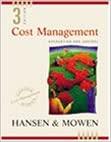Consider the following conversation between Gary Means, manager of a division that produces industrial machinery, and his
Question:
Consider the following conversation between Gary Means, manager of a division that pro¬duces industrial machinery, and his controller, Donna Simpson, a CMA and CPA:
GARY: Donna, we have a real problem. Our operating cash is too low, and we are in des¬
perate need of a loan. As you know, our financial position is marginal, and we need to show as much income as possible—and our assets need bolstering as well.
DONNA: I understand the problem, but I don't see what can be done at this point. This is the last week of the fiscal year, and it looks like we'll report income just slightly above break-even.
GARY: 1 know all this. What we need is some creative accounting. 1 have an idea that might help us, and I wanted to see if you would go along with it. We have 200 partially finished machines in process, about 20% complete. That compares with the 1,000 units that we com¬
pleted and sold during the year. When you computed the per-unit cost, you used 1,040 equivalent units, giving us a manufacturing cost of $1,500 per unit. That per-unit cost gives us cost of goods sold equal to $1.5 million and ending work in process worth $60,000. The presence of the work in process gives us a chance to improve our financial position. If we report the units in work in process as 80% complete, this will increase our equivalent units to 1,160. This, in turn, will decrease our unit cost to about $1,345 and cost of goods sold to
$1,345 million. The value of our work in process will increase to $215,200. With those fi¬
nancial stats, the loan would be a cinch.
DONNA: Gary, I don't know. What you're suggesting is risky. It wouldn't take much au¬
diting skill to catch this one.
GARY: You don't have to worry about that. The auditors won't be here for at least six to eight more weeks. By that time, we can have those partially completed units completed and sold. 1 can bury the labor cost by having some of our more loyal workers work overtime for some bonuses. The overtime will never be reported. And, as you know, bonuses come out of the corporate budget and are assigned to overhead—next year's overhead. Donna, this will work. If we look good and get the loan to boot, corporate headquarters will treat us well. If we don't do this, we could lose our jobs.
Required:
1. Should Donna agree to Gary's proposal? Why or why not? To assist in deciding, review the standards of ethical conduct for management accountants described in Chapter 1.
Do any apply?
2. Assume that Donna refuses to cooperate and that Gary accepts this decision and drops the matter. Does Donna have any obligation to report the divisional manager's behav¬
ior to a superior? Explain.
3. Assume that Donna refuses to cooperate; however, Gary insists that the changes be made. Now what should Donna do? What would you do?
4. Suppose that Donna is sixty-three years old and that the prospects for employment else¬
where are bleak. Assume again that Gary insists that the changes should be made. Donna also knows that Gary's superior, the owner of the company, is his father-in-law. Under these circumstances, would your recommendations for Donna differ? If you were Donna, what would you do?
Step by Step Answer:

Cost Management Accounting And Control
ISBN: 9780324002324
3rd Edition
Authors: Don R. Hansen, Maryanne M. Mowen





